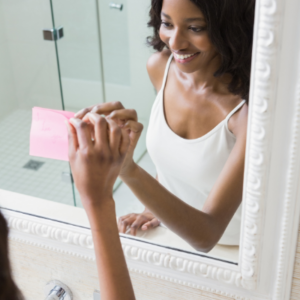
Have you ever come across some older photos of yourself and thought something along the lines of:
– “Wow, I looked so good here. If I could have this body again, I’d actually appreciate it this time.”
– “I thought I was so large then. If I knew what I would look like now, things would be different.”
– “I used to look so good. Why was I so hard on myself?”
If the answer is yes, you are not alone. These thoughts can often leave us feeling frustrated and down on ourselves and can lead to intentional shifts in our eating and exercising patterns in order to “fix” how we feel about ourselves through changing our outside appearance. These thoughts are often evidence that our body image has a lot more to do with how we feel about our bodies rather than what we actually look like. If we pause and reflect on the roots of our negative body image, we can then shift the work to focus on the true source rather than the one that was masking it.
What is Body Image?
 Before we dive into this answer, it may be helpful for us to begin with talking about what body image is. The National Eating Disorders Association (NEDA) defines body image as “how you see yourself when you look in the mirror or when you picture yourself in your mind.” This can include the beliefs you hold about your own appearance, how you feel about your body size/shape/weight, and how you connect with your body.
Before we dive into this answer, it may be helpful for us to begin with talking about what body image is. The National Eating Disorders Association (NEDA) defines body image as “how you see yourself when you look in the mirror or when you picture yourself in your mind.” This can include the beliefs you hold about your own appearance, how you feel about your body size/shape/weight, and how you connect with your body.
Rather than thinking of body image as either good or bad, it can be helpful to think of it existing on a spectrum with areas between the two extremes. According to Tylka (2011), positive body image is defined as individuals’ appreciation for, protection and acceptance of and connection with their physical selves. Very similar to how happiness is not just the absence of sadness, positive body image is not solely defined by the absence of negative thoughts about one’s body.
Why is your body image important?
A 2004 study found that women with more positive body image also possessed additional healthful characteristics such as higher optimism and self-esteem, and lower perfectionistic self-presentation compared to women that reported higher levels of body dissatisfaction. There was also an association found between positive body image and fewer depressive symptoms, higher self-esteem, fewer unhealthy dieting behaviors such as skipping meals or using dieting pills (Williams et al., 2004). In a nutshell, how we feel about our bodies can lead to behaviors that have an impact on our overall mental and physical wellbeing. Our bodies will change over the course of our lives and chances are, you’ve experienced this through growth, puberty, entering adulthood, motherhood, illness, and so much more. As we go through these inevitable changes, building skills that foster a respectful and kind relationship with our bodies can help us maintain our mental and physical health.
How to Deal with Body Image
 It is completely normal to not like your body 100 percent of the time, but it can become harmful over time to change your eating or exercising behaviors because of this. Think about body image like an important relationship in your life, such as one with a partner, best friend or parent – are you always completely happy in this relationship or are there sometimes brief periods of frustration, occasional bickering or annoyance? You might be seeing where I’m heading with this… If we were to compare your relationship with your body to the important ones in your life, do you notice any differences? Any similarities? Would you speak to this person the same way that you do to your body? If there are far more differences than similarities in these relationships, it might feel overwhelming to determine how to begin strengthening this relationship. It is okay to start small and do what feels most comfortable to you. This could look like:
It is completely normal to not like your body 100 percent of the time, but it can become harmful over time to change your eating or exercising behaviors because of this. Think about body image like an important relationship in your life, such as one with a partner, best friend or parent – are you always completely happy in this relationship or are there sometimes brief periods of frustration, occasional bickering or annoyance? You might be seeing where I’m heading with this… If we were to compare your relationship with your body to the important ones in your life, do you notice any differences? Any similarities? Would you speak to this person the same way that you do to your body? If there are far more differences than similarities in these relationships, it might feel overwhelming to determine how to begin strengthening this relationship. It is okay to start small and do what feels most comfortable to you. This could look like:
- Putting a kind affirmation on your mirror to disrupt negative body talk (Etsy is a great place for these, but you can quickly DIY with a whiteboard marker!) – Donating old clothes that no longer fit or storing them out of sight – Create a routine to remember your daily medications or vitamins as they help your body stay healthy
- If it’s accessible, buy or thrift new clothes that fit your body and you feel comfortable in
- Doing a social media cleanse by unfollowing or muting accounts that increase body shame or comparison and following ones that uplift you and are more representative of your body shape and size
- Stretching for 10-15 minutes after a day of work at your desk as you’ve noticed it helps with reducing stress and tension
- Meeting with a weight-inclusive registered dietitian to have a non-judgmental, safe space to explore your body image as it relates to your nutrition and movement patterns
Your relationship with your body is the longest relationship you will have. It is okay for there to be ups and downs, but despite all of this, your body still deserves to be treated with respect and kindness.
Tylka, T. L. (2011). Positive psychology perspectives on body image. In T. F. Cash & L. Smolak (Eds.), Body image: A handbook of science, practice, and prevention (2nd ed., pp. 56–64). New York: Guilford Press.
Williams, E. F., Cash, T. F., & Santos, M. (2004, November). Positive and negative body image: Precursors, correlates, and consequences Poster presented at the Conference of the Association for Advancement of Behavior Therapy, New Orleans, LA.
